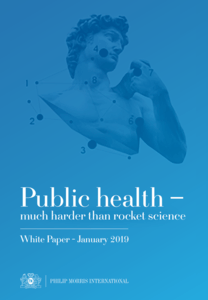Philip Morris: White Paper Whitewash
The highly esteemed tobacco company, Philip Morris International (PMI), in January 2019 published an anonymous fifty-five page document entitled Public Health – Much Harder than Rocket Science. They modestly call it a White Paper, as if it’s an official government report, and it’s padded out with eighteen artistic black-and-white photos of no relevance to public heath except for one of an oil refinery.
Brilliant copywriter
Putting aside the question of the curious situation of what a cigarette company is doing in the field of public health, I must I take my hat off to the copywriter who was inspired to think up the ingenious slogan: ‘Much Harder than Rocket Science’.
First, for the benefit of the ignorant, they explain what rocket science literally means.
Then, in big blue letters, we come across a statement of the obvious:
If there were quick fixes to today’s public health issues, nobody would be obese, nobody would smoke cigarettes, nobody would create air pollution, nobody would drink too much alcohol or get addicted to opioids.
But there is a quick fix for the smoking problem: stop making cigarettes! But no. PMI would have you believe tackling smoking is as difficult as dealing with obesity, air pollution, alcoholism, etc., and that they have a legitimate seat at the table with other agencies dealing with these major public health issues.
Blaming the victim
Next, they repeat the deceptions mentioned in the open letter to the global leadership community about which I wrote in my previous blog, Philip Morris – Saviour of the World:
As long as consumers don’t have the desire to abstain from using risky products or fundamentally change their behaviors, it will be incumbent on corporations to offer new, significantly less harmful products that are acceptable enough to consumers so that those who would otherwise continue the harmful behavior switch to them completely instead.
PMI uses these distortions to put the blame onto their consumers, that is, people addicted to cigarettes, for not having the desire to abstain or fundamentally change their behaviours. And since smokers evidently lack these desires, therefore it’s ‘incumbent’ on PMI to offer less harmful products.
The reason people smoke is not for lack of a desire to quit: they smoke because they find themselves unable to quit – because they’re addicted to the nicotine in cigarettes which the likes of PMI sold in the first place.
And how noble of PMI to honour their incumbency (duty or obligation) to help those poor suckers who are addicted to the tobacco industry’s poisonous products, by offering them alternative, allegedly less poisonous, products! How about fulfilling their self-declared duty or obligation by helping their consumers – victims would be a better word – to quit completely by ceasing to make cigarettes? This is their aim, they say, but when will it be achieved? They won’t tell us, but conveniently leave it open till some vague time in the future.
Patronising potted history
Let’s continue with our examination of the White Paper.
It contains a patronising chattily written potted history of public health, containing such edifying sentences as, ‘First, there are people in general,’ and ‘Now there’s a constant all-you-can-eat supply of health-related information for concerned consumers to binge on.’
Having set the tone, PMI tell us that they commissioned a survey of 10,000 people who were asked to rate their level of concern about various public health issues, presented in this order: Obesity, Alcohol consumption, Smoking, Air pollution, Mental health, Unwanted pregnancies, and Opioid abuse.
Note how smoking is craftily slotted in near the middle of this list of serious problems.
Challenging authorities
When they at last come to the point, we find this:
If consumers are serious about not smoking, why don’t they simply quit or never start? If authorities are serious about dealing with smoking, why don’t they simply make cigarettes illegal? And if tobacco companies are serious about cigarettes being harmful then why don’t they simply stop producing cigarettes?
We have dealt with how they deceitfully try to blame smokers themselves in the first sentence, under the heading ‘Blaming the victim’, above.
Now note in the second sentence how PMI tries to put the blame on ‘authorities’ for not making cigarettes illegal. They are safe to say this because they know authorities – presumably they mean governments – will do no such thing. It’s on a par with central American drug dealers paying off the authorities to turn a blind eye. Only in the case of cigarettes, governments are bought off with huge tax revenues from tobacco. Token measures instigated by the Tobacco Control Industry discourage smoking to some extent, but don’t make much of a dent in PMI’s profits.
It’s the third sentence in the above quoted challenges on which I shall now focus: ‘And if tobacco companies are serious about cigarettes being harmful then why don’t they simply stop producing cigarettes?’ Here is PMI’s answer:
An individual company could, in theory, simply decide to stop cold. But this would do nothing to address the public health issue because other companies would rush in to take up the slack.
This is an attempted justification of the kind, ‘If I don’t do it, someone else will.’ But if something is wrong of itself, it should not be done even if others will. Examples often quoted to illustrate this false reasoning are working on chemical warfare research or the controller of the gas supply at Belsen.
Money trumps morals
What should not be underestimated is that if a company of the stature of PMI were to do the decent thing (don’t laugh) and unilaterally announce its intention to stop making cigarettes on a certain date, say within five years, this could not but have a salutary effect on other cigarette makers. And if PMI, in its desire to be seen as responsible and contributing to the good of humanity (I told you not to laugh!), even if they put themselves out of business, they would be a shining example of morals over money. (How many times have I got to tell you not to laugh?!)
PMI, the company that did the right thing! Let them continue pouring their billions into developing alternative products, but if they really have faith in this activity, why are they hedging their bets? We’ll stop making cigarettes – but only when we’ll make an equal or greater amount of money by poisoning our consumers with our new-fangled drug-delivery device (called IQOS) as we currently do by poisoning them with our old-fashioned cigarette drug-delivery device!
What makes PMI’s claim ring hollow – no matter how much they dress it up in a White Paper – is that there is no date.
Tell us the date!
I call upon Mr André Calantzopoulos, CEO of PMI, to tell us now the date when he will commit to stop making cigarettes.
Text © Gabriel Symonds

